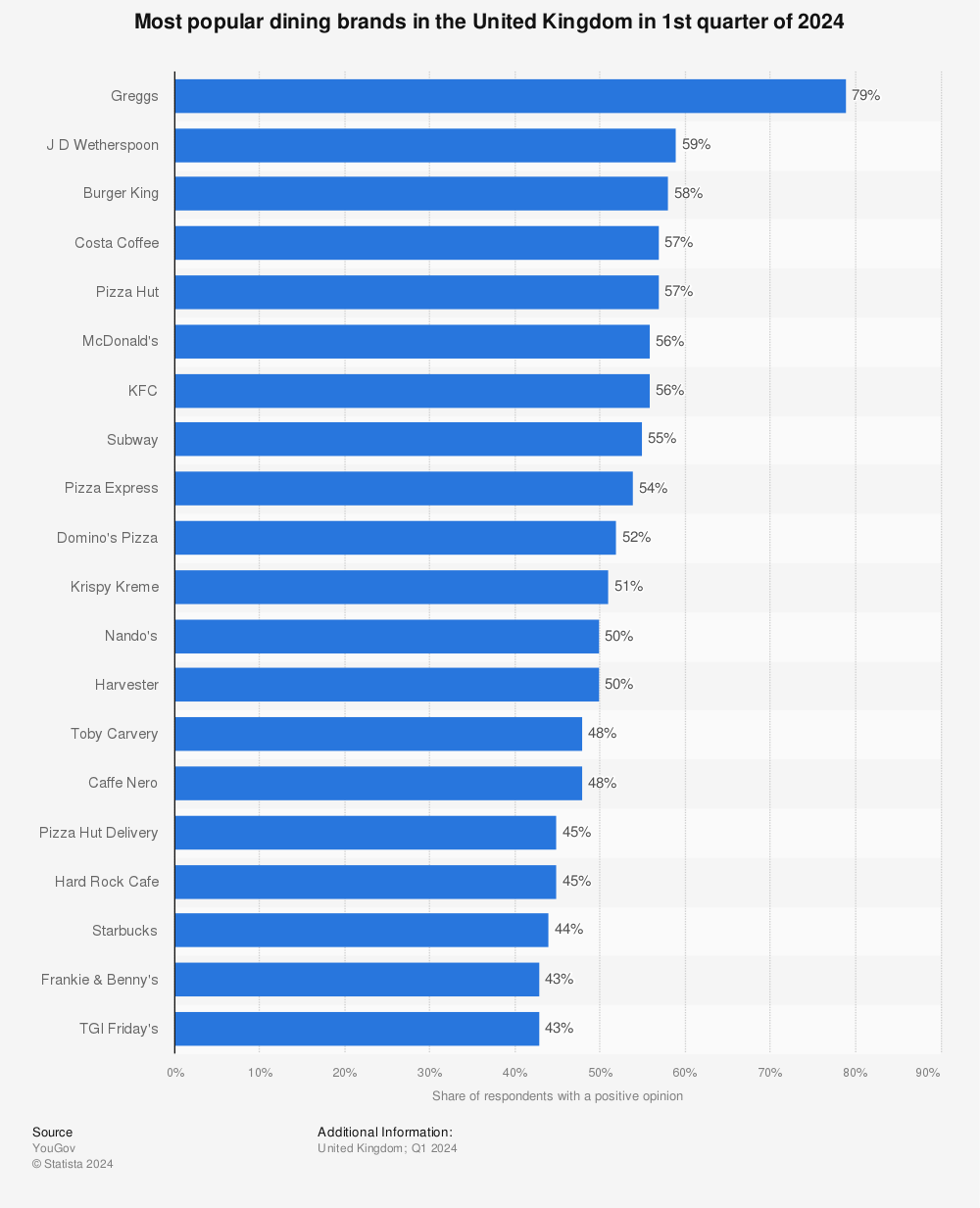What Are The Top 5 Fast Food Restaurants in the UK?
Table of Contents
- Brief Overview of the UK Fast Food Market
The United Kingdom’s fast food market is a dynamic and ever-evolving landscape that mirrors the diverse culinary preferences of its population. From traditional favourites to contemporary innovations, the fast food sector in the United Kingdom is a rich tapestry of cuisines and options. In this article, we look at the complexities of this market, revealing the trends, players, and influences that form the nation’s fast food culture.
- Importance of the Fast Food Industry in the UK
The fast food industry is pivotal in the United Kingdom’s socio-economic fabric. Beyond being a quick and convenient meal option, it significantly contributes to employment and economic growth. The Fast Food industry employs a substantial portion of the workforce; the sector offers job opportunities and plays a crucial role in the nation’s Gross Domestic Product (GDP). Understanding the importance of the fast food sector goes beyond the realm of culinary appreciation; it provides insights into the broader economic and social dynamics of the UK.

Top 5 Fast Food Chains
McDonald’s
McDonald’s, a global fast-food giant, made its foray into the UK market with a strategic vision for expansion. Originating from the USA, the brand’s history in the UK is marked by a meticulous approach to localisation, adapting its offerings to suit British tastes. This global icon has over 1,300 outlets in the UK. This fast-food giant generates an annual revenue exceeding £1.5 billion.
Signature Menu Items and Innovations
The iconic Golden Arches has become synonymous with a menu that caters to diverse preferences. Beyond the iconic Big Mac, McDonald’s showcases a seamless blend of culinary tradition and technological innovation, from the classic Big Mac to region-specific innovations, McDonald’s continually introduces new offerings, blending global staples with local flavours to maintain its relevance in the UK market.
KFC
Since its arrival, Kentucky Fried Chicken (KFC) has left an indelible mark on the UK’s fast food landscape. Originating in the USA, KFC strategically expanded its presence in the UK, embracing the nation’s love for fried chicken and introducing a range of menu items tailored to local tastes.
Popular Menu Items and Market Strategies
KFC’s success in the UK can be attributed to its ability to resonate with consumers. The brand’s market strategies and signature items like the Original Recipe Chicken have solidified its position as a go-to choice for those craving delicious and hearty fast food.
KFC – Fried Chicken Dominance
KFC’s finger-licking goodness translates into a yearly revenue of £2.35 billion. With over 900 outlets, KFC maintains its stronghold on the UK fast-food market, appealing to diverse tastes.
KFC’s offerings contribute a 4% yearly growth rate from the original recipe to innovative menu additions. The brand continues to captivate customers with its diverse and enticing choices.
Subway
Subway’s Unique Positioning in the UK
Subway has become a notable player in the UK’s fast food market, distinguishes itself through a unique positioning – offering a healthier alternative with its customisable sandwiches. The brand’s emphasis on fresh ingredients and personalisation has garnered a dedicated customer base.
Customization and Health Trends
Subway’s dedication to personalization is in harmony with the growing inclination towards health-conscious food selection. In an era where consumers seek nutritious options, Subway’s menu flexibility caters to individual preferences, making it a notable contender in the UK fast food scene.
Subway, generates an annual revenue of £515 million in the UK. With over 2,500 outlets, its emphasis on fresh and customisable choices contributes to its widespread popularity. ubway’s lower-calorie menu options contribute to a yearly growth rate of 2.5%, positioning it as a leader in healthier fast-food alternatives.

Costa Coffee – Premium Coffee Experience
Costa Coffee, synonymous with premium coffee, generates an impressive £2 billion annual revenue. With over 2,800 stores, it commands a significant share of the £10 billion UK coffee shop market.
Ambience and Community
Beyond coffee, Costa Coffee’s commitment to ambience and community contributes to a 3.5% annual growth rate. Its outlets serve as social hubs, attracting patrons seeking a holistic coffee experience.
Greggs
Rise of Greggs as a Fast-Food Giant
From its humble beginnings as a bakery, Greggs has transformed into a fast-food giant in the UK. The brand’s evolution is marked by a strategic shift towards a broader menu, incorporating traditional bakery items and contemporary fast food offerings.
Greggs’ success lies in its ability to adapt to changing consumer preferences. While retaining its emphasis on bakery classics, the brand has diversified its menu to include healthier options, reflecting the evolving tastes and demands of the UK market.
Bakery Excellence
The British bakery icon Greggs boasts a yearly revenue of £2.03 billion. Its affordability and delectable offerings resonate, contributing to a 7% share of the UK food-to-go market.
Community Engagement
With 2,078 outlets, Greggs actively engages with local communities. This grassroots approach enhances brand loyalty, reflected in its impressive 11% growth in revenue.
Pizza Hut
Pizza Hut, a global pizza brand, has established a strong presence in the UK market.
Pizza Hut, an international pizza brand, has firmly positioned itself in the UK market. The brand’s achievements can be credited to its adeptness in fusing classic Italian tastes with inventive toppings, resulting in a varied menu that appeals to a broad audience.
According to Statista “Pizza Hut (UK) Limited, the company operating the Pizza Hut brand in the United Kingdom, generated a turnover of approximately 129.62 million British pounds in 2021.”

Find more statistics at Statista
Diversification and Market Challenges
Pizza Hut, a global pizza franchise, has firmly established itself in the UK market. The brand’s success is attributed to its skilful blending of traditional Italian flavours with creative toppings, crafting a diverse menu that resonates with a broad audience.
Emerging Trends in the UK Fast Food Industry
Health-Conscious Choices
As consumer awareness regarding health and wellness grows, a noticeable shift towards healthier fast food options is happening. Fast-food chains are responding by incorporating nutritious ingredients, offering low-calorie alternatives, and providing transparent nutritional information to meet the demands of health-conscious consumers.
Sustainability Initiatives
The fast food industry in the UK is increasingly embracing sustainability as a core value. Establishments are making concerted efforts to reduce their environmental impact by switching from eco-friendly packaging to responsibly sourced ingredients. Sustainability initiatives resonate with environmentally conscious consumers and contribute to the overall positive image of fast food brands.
Technological Advancements in Service
In an era dominated by technology, the UK fast food industry is leveraging advances to enhance customer experience. From mobile ordering apps to contactless payment options, technology is streamlining service processes, offering convenience, and adapting to the preferences of a tech-savvy consumer base.
Consumer Preferences
- Demographics Influencing Choices
Diverse demographics influence consumer preferences in the UK fast food industry. From the younger generation seeking innovative and trendy options to families valuing convenience, understanding the varied demographic factors is crucial for fast-food establishments to tailor their offerings effectively.
- Impact of Cultural Diversity on Fast od Demand
The UK’s cultural diversity is reflected in its population’s fast food choices. The demand for diverse cuisines, influenced by the rich mixture of cultures within the country, has led to the inclusion of international flavours in fast food menus. This cultural fusion broadens the options for consumers and adds a layer of culinary excitement to the fast-food landscape.
Economic Impact
- Contribution to Employment
The fast food industry significantly contributes to employment in the UK, providing jobs across various skill levels.
From entry-level to managerial roles, the industry plays a pivotal part in providing opportunities for a diverse workforce, contributing to the nation’s economic stability.
- Economic Trends Influenced by the Fast Food Industry
Beyond job creation, the economic impact of the fast food industry extends to supply chains, real estate, and ancillary services. The industry’s growth influences economic trends, contributing to the vitality of local economies and shaping consumer spending patterns.
Regulatory Environment
- Government Regulations on Fast Food
The UK government has implemented regulations addressing various aspects of the fast food industry, including health standards, advertising practices, and information disclosure. Compliance with these regulations is essential for establishments to maintain public trust and adhere to industry standards.
- Compliance Challenges and Industry Response
Navigating the regulatory landscape poses challenges for fast food chains. Compliance with health and safety standards, menu labelling requirements, and marketing restrictions require strategic planning. The industry’s response to these challenges ensures legal adherence and showcases a commitment to ethical business practices.

Challenges Faced by the Fast Food Industry
- Health Concerns and Changing Consumer Preferences
The increased health consciousness has resulted in a heightened examination of fast food choices. Addressing health concerns, such as the nutritional content of menu items and the impact of fast food on well-being, poses a challenge for the industry. Adapting to changing consumer preferences towards healthier alternatives is essential for long-term sustainability.
- Competition and Market Saturation
The UK fast food industry is marked by intense competition, with numerous players vying for consumer attention. Market saturation in specific segments requires brands to differentiate themselves through innovation, quality, and effective marketing strategies to maintain a competitive edge.
Innovations and Adaptations
- Tech-Driven Innovations
Technology is at the forefront of innovations in the UK fast food industry. From automated order processing using artificial intelligence in customer service, tech-driven innovations enhance efficiency and elevate the overall dining experience.
- Menu Adaptations to Meet Evolving Demands
Fast-food chains are continuously adapting their menus to align with evolving consumer demands. This includes introducing plant-based options, gluten-free choices, and catering to specific dietary preferences. Menu adaptations reflect a responsiveness to changing consumer lifestyles and preferences.
Related articles:
Growth Of The Restaurant Industry In The UK
How To Start A Fast Food Restaurant
Restaurant Operations Management
Future Outlook
- Projected Growth and Challenges
The future of the UK fast food industry is poised for growth, driven by evolving consumer preferences, technological advancements, and a focus on sustainability. However, health concerns, regulatory challenges, and market dynamics require strategic solutions for sustained success.
- Anticipated Changes in Consumer Behavior
Anticipating shifts in consumer behaviour is crucial for fast-food establishments. As the landscape evolves, an increased emphasis on health, sustainability, and convenience will likely influence how consumers interact with and choose fast food options.
Conclusion
Our exploration of the UK’s top 5 fast food industries has revealed a diverse and dynamic landscape. From the rich history of iconic brands like McDonald’s to the ease of artisanal fast food and the challenges posed by health concerns, each facet contributes to the multifaceted nature of the industry.
The fast food industry in the UK is more than a collection of eateries; it reflects cultural diversity, economic impact, and a response to evolving consumer preferences. Understanding its significance goes beyond the satisfaction of hunger; it provides insights into the intricate connections between food, culture, and commerce in the United Kingdom.
FAQs
Q: What is the top 5 fast food in the UK?
A: The fast food landscape in the UK boasts a diverse range of options. Some of the top players include McDonald’s, KFC, Subway, Greggs, and Pizza Hut. Each brand offers a unique culinary experience, contributing to the country’s rich tapestry of fast food choices.
Q: Who are the fast food market leaders in the UK?
A: The fast food market in the UK is led by prominent brands that have established a strong presence. Market leaders include McDonald’s, renowned for its global appeal; KFC, with its iconic fried chicken; Subway, offering customisable sandwiches; Greggs, known for its bakery delights; and Pizza Hut, a stalwart in the pizza segment.
Q: How big is the fast food industry in the UK?
A: The fast food industry in the United Kingdom is substantial in terms of economic contribution and cultural influence. The industry’s economic impact is essential, employing a significant portion of the workforce and contributing significantly to the nation’s GDP. Moreover, the diverse culinary offerings cater to a wide range of tastes, making it a crucial component of the UK’s food culture.
Q: What fast food franchises are in the UK?
A: The UK hosts a multitude of fast-food franchises, offering an array of choices to consumers. Besides the aforementioned market leaders, other notable franchises include Burger King, Nando’s, Domino’s Pizza, Costa Coffee, and Pret a Manger. These franchises contribute to the country’s varied and dynamic fast-food landscape.

